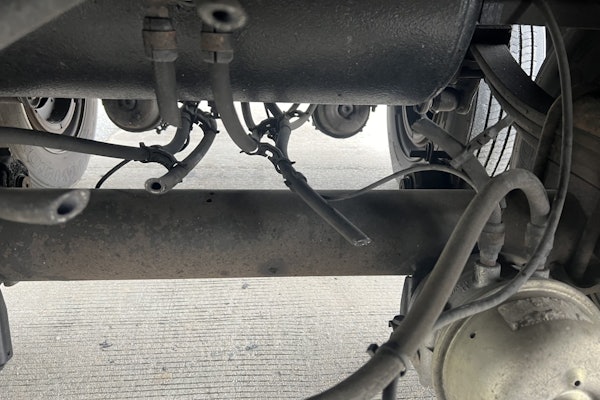Manufacturers take varied approaches on warranties to calm fears and to get the new engines off and running.
Engine makers have worked for four years to meet the challenge of meeting new standards for reduced emissions by Oct. 1. In recent months they’ve wrestled with another challenge – to calm buyers’ reservations about the emissions-compliant engines.
A strong warranty is one way to do that, especially since potential buyers have said their main concern about the engines is reliability. The heavy-duty engine makers involved – Cummins, Detroit Diesel, Caterpillar, Volvo and Mack – are keeping their standard warranties and expect engine life to remain at 1 million miles. Some have spit-shined their extended warranties to attract buyers as soon as possible to avoid a plunge in sales.
In addition to reliability questions, engine makers are tasked with selling products that will cost an estimated $2,000 to $5,000 more and will have slightly less fuel efficiency than recent engines. All but Caterpillar are using cooled exhaust gas recirculation to reduce nitrogen oxide emissions.
Cummins will continue its two-year, 200,000-mile warranty and is expanding its extended warranty offering for its new heavy-duty ISX and ISM engines. “We offer multiple options that provide customers protection out to five and even seven years and up to 500,000 miles,” says spokesperson Amy Davis.
Cummins went further. Its new Uptime Guarantee will be standard on engines made between Oct. 1 and March 31, 2003. That means the engine maker will repair defective ISM or ISX engines within 24 hours or rent a replacement vehicle for owners. Coverage extends through Dec. 31, 2003.
The aggressive warranty was prompted by industry misinformation about EGR, and Cummins remains confident that its engines will be as reliable as ever, says Marketing Director Tom Kieffer.
For a limited time, Peterbilt and Kenworth are offering free extended warranties and other discounts on tractors with the new Cummins engines – a savings of $800 to $1,800.
Freightliner is offering a similar special that runs for six months with Detroit Diesel-equipped trucks: five-year, 500,000-mile coverage.
With Detroit, “Not even one word in the warranty has changed,” says John Morelli, vice president of the Series 60 engine program. The standard warranty is two years, unlimited mileage, with five-year, 500,000-mile coverage on major components. The base warranty has not changed since its introduction in 1987.
“We do not expect the life-to-overhaul of the EGR-equipped engines to be any different than current engines,” says Tom Freiwald, vice president of marketing.
Volvo did not change its warranties, but because it is an integrated manufacturer, it was able to take advantage of the emissions mandate by redesigning its VN series to mesh with the new engine technology.
“We weren’t going to try and make a new engine fit into a chassis it was never designed for, under an old hood with a grill opening that is too small for the cooling requirements of the new engines,” says Susan Alt, vice president of marketing at Volvo Trucks North America.
Standard engine coverage will be 24 months, 250,000 miles or 6,250 hours. Extended warranty plans go up to 60 months and 500,000 miles.
Caterpillar will retain its current warranty on its new engine that uses its proprietary ACERT technology to meet emissions standards. It will be available in early 2003.
“We do not plan to change any engine warranties due to emission changes or new engine designs,” says spokesperson E. Charles Timmes.
A bridge engine now available has some ACERT technology, but will not be fully compliant with the tougher emissions guidelines. Caterpillar has said it will not pass to consumers the cost of fines it will pay to the Environmental Protection Agency for selling the bridge engine.
Mack has also decided not to change anything in its standard warranty or extended coverage. Its basic warranty is 36 months, 300,000 miles, with extended coverage on major components to 60 months, 500,000 miles.
Truck and engine makers offer varying warranty programs. Talk to a dealer to learn the full scope of options.
DO YOUR PART
As always, keeping up with maintenance is important to ensuring that your warranty will be honored. If it’s obvious the problem is maintenance-related, such as not changing the oil at the correct intervals, the repair will not be covered by the warranty.
“Operators should keep good records of all maintenance performed, along with receipts that show where the parts were purchased, the brand names used and who performed the repairs,” says Tom Freiwald of Detroit Diesel. “The Detroit oil change intervals remain the same – 15,000 miles. But developing an oil analysis program can extend this interval.”
Oil changes are more important than ever because the exhaust gas recirculation system used in most new engines tends to put more contaminants in the oil. The new CI-4 oil is intended to compensate for that.
And another point to pay attention to is maintenance of the cooling system, which will be carrying more heat away and will be getting trace amounts of dirtier combustion gases in it. You should follow the manufacturer’s standards or use an analysis program and get factory approval for any extension of normal change intervals to cover yourself.
As with any warranty, make sure you know which parts are covered and for how long. For example, Mack’s fuel injector coverage runs out at 200,000, Cummins’ at 125,000 and Detroit’s at 100,000.






